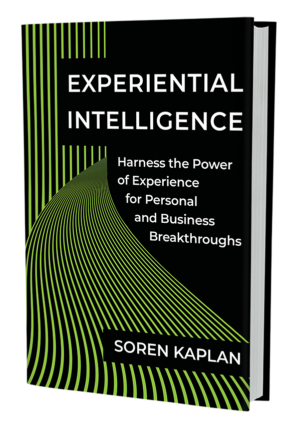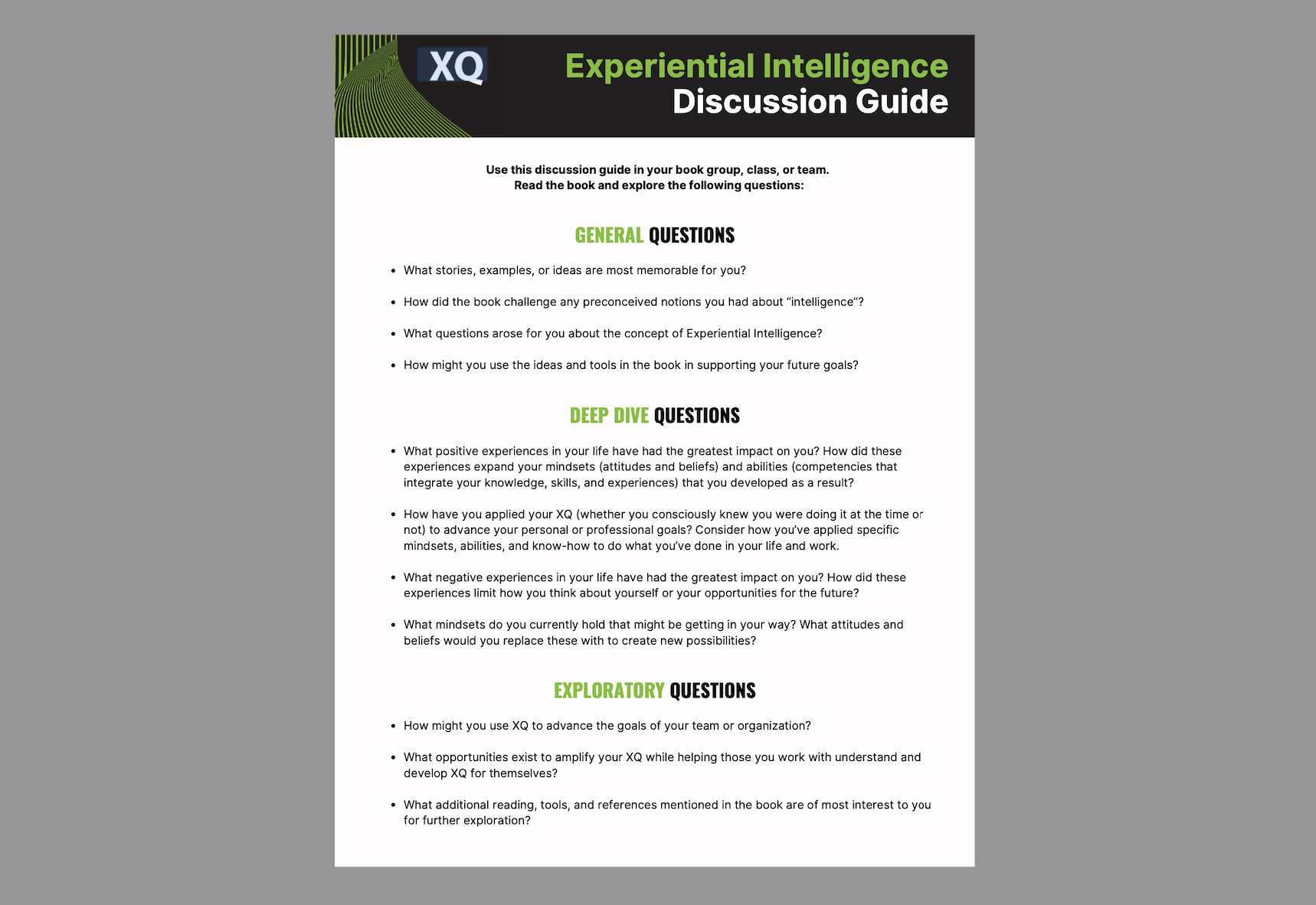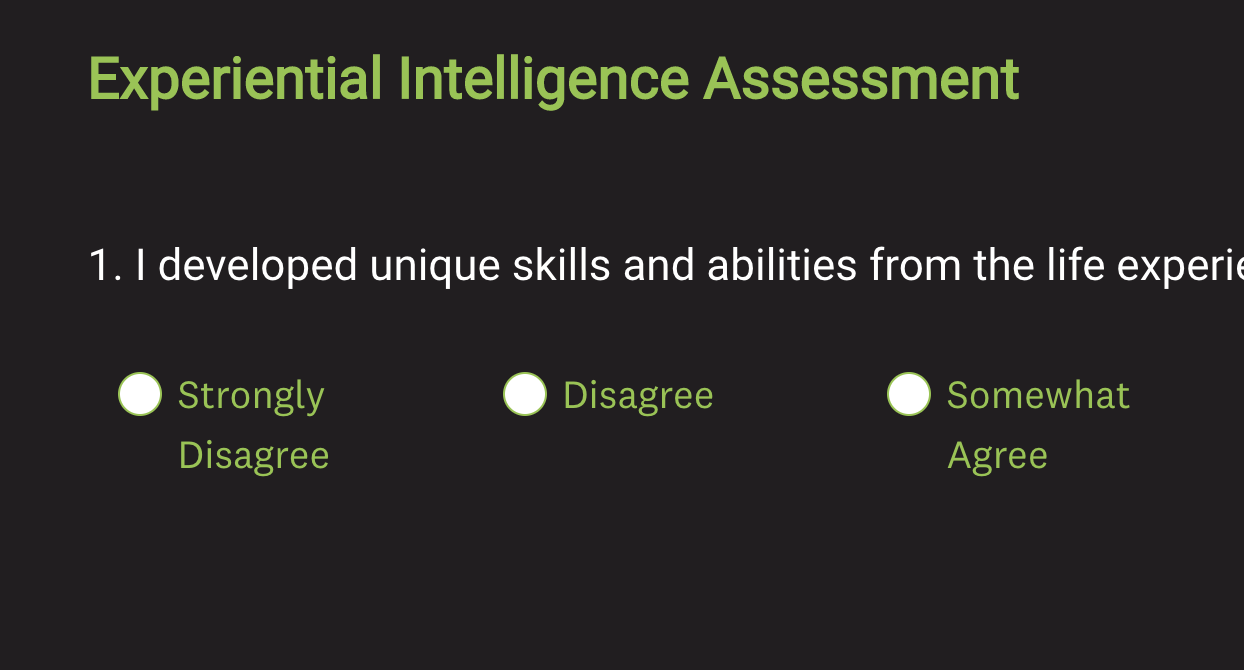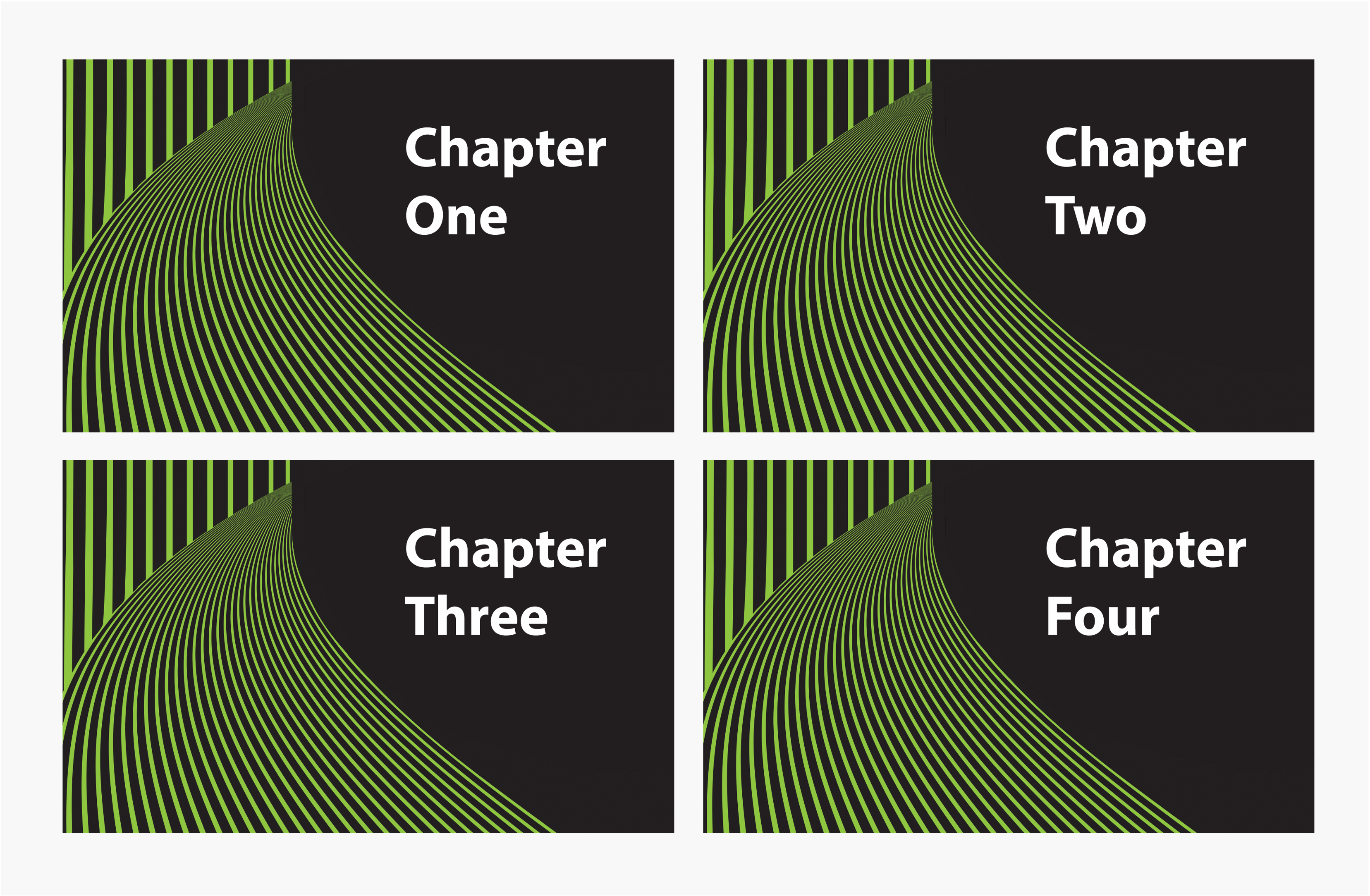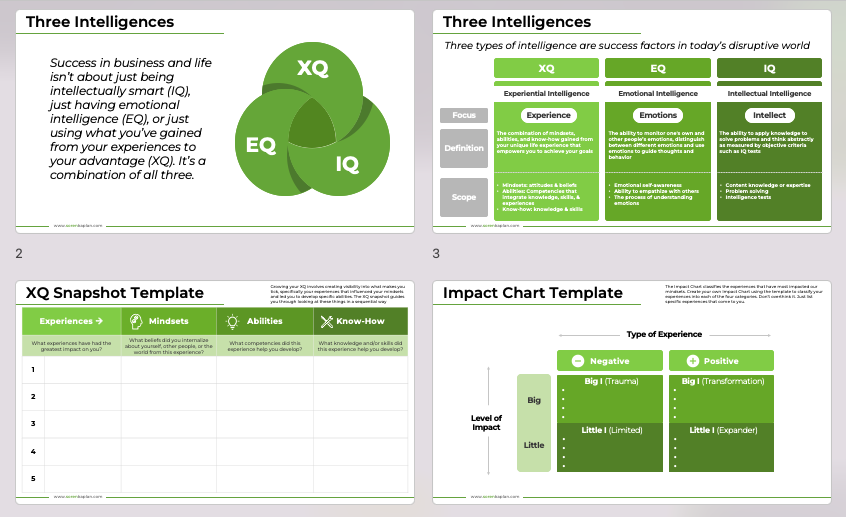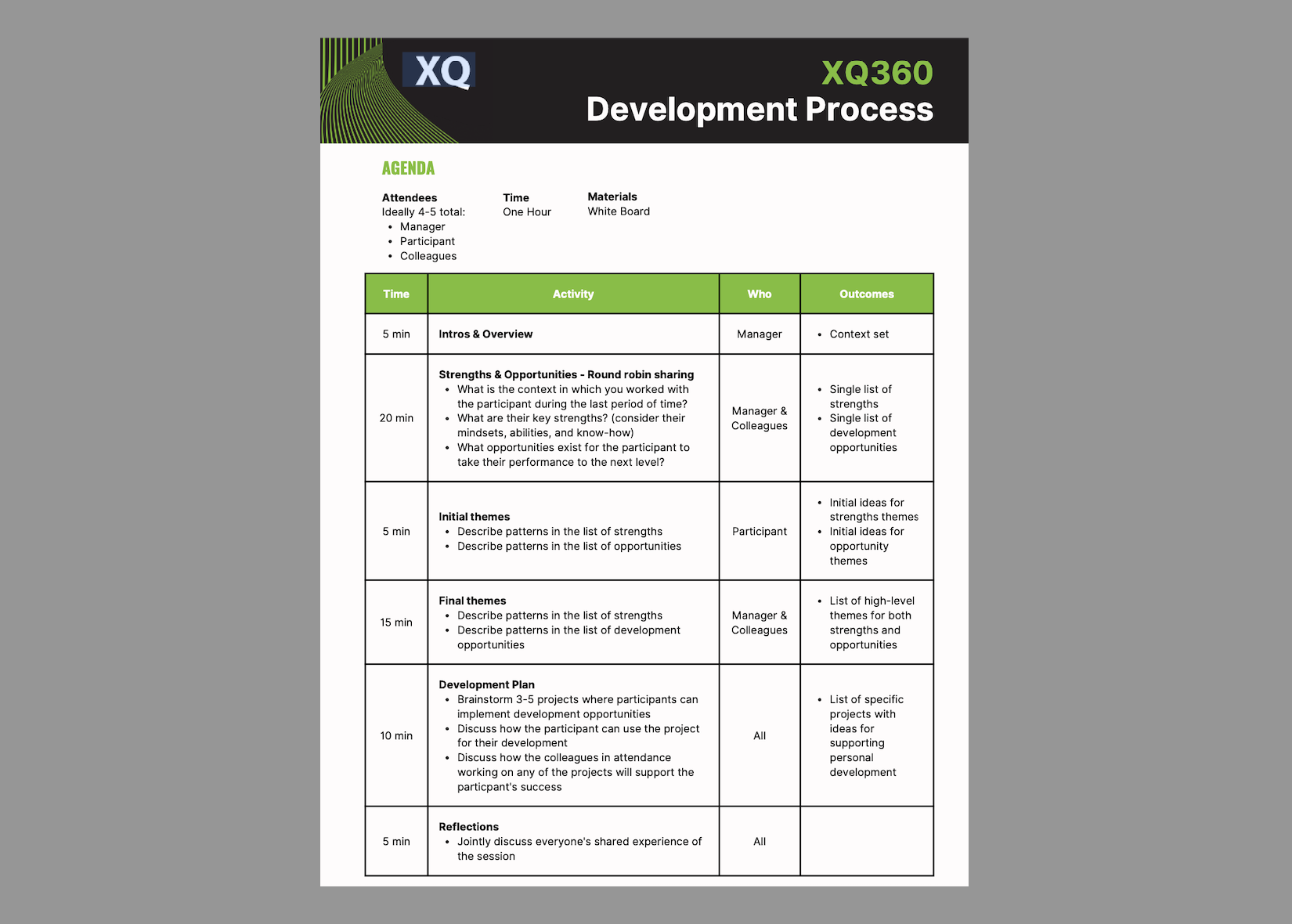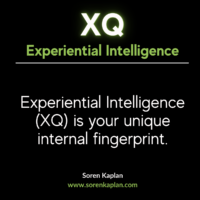




First there was IQ to predict success. Then Emotional Intelligence (EQ). Now, Experiential Intelligence (XQ) expands our understanding of what’s needed to thrive in today’s disruptive world.
Soren Kaplan, Ph.D.
Introduction
After working with 1000’s of leaders from around the world, including executive development programs with Disney, Colgate, Medtronic, American Nurses Association, and many others, here’s the backstory behind my book…
My childhood was less than ideal. My mother developed a mental illness when I was three. My father, who worked multiple jobs and was consumed by his spiritual pursuits, was rarely home. As my parents struggled to make ends meet, we bounced around from one home to another. By the time I was fifteen, I had moved sixteen times.
As paradoxical as it may sound, the same things that traumatized me early on also delivered unique gifts that I successfully use in the workplace today. Once I was able to view my life experiences in a new light (and all the things I “practiced” doing for many years), I became more capable of seeing my hidden strengths. I realized I instinctively understood how to work with limited data, check assumptions, decipher unwritten rules, hedge bets, and quickly pivot in new directions – the same things I’ve use to run startups, help Fortune 500 companies transform their organizational cultures, and provide leadership development to managers around the world.
That’s why I wrote this book. What I discovered through my own personal experiences, working with thousands of leaders globally, and applying research from some of the leading universities around the world is this: We all possess real intelligence that involves how we view opportunities, perceive challenges, and tackle goals based on the accumulated wisdom and talents we’ve gained through our lived experience.
Your Experiential Intelligence includes the psychological, sociological, and neurological forces that make you tick. Gaining insight into your “XQ” will help you learn how to uncover your hidden assets, remove invisible barriers limiting peak performance, and amplify strengths to achieve breakthroughs for yourself, your team, and your organization.
Experience Drives Success in Today’s Disruptive World
Malcolm Gladwell popularized the idea that doing something for 10,000 hours makes you an expert. Based on the 10,000-hour rule, your IQ score has little to do with your ability to reach the top of your field. It comes from experience.
From a broader perspective, there’s a slang term that touches the surface of this seemingly intangible intelligence: “street smarts.” Street smarts is usually used to describe people with a lack of formal education to indicate they’re actually “smart,” but not in the traditional sense of the term. They’ve developed abilities to do certain things that give them an edge in life. But even the idea of being street smart or having some type of know-how ignores the deeper process that created this intelligence in the first place. It’s not just about the hard skills we may develop to do something; it’s also about the way we think and the abilities we develop that become part of who we are as people.
Certain disciplines recognize the value of Experiential Intelligence without calling it XQ by name. “Extreme users,” for example, are people who spend an inordinate amount of time doing something at the extreme edge of what’s considered “normal.” Market researchers like to talk to extreme users because their knowledge of the ins and outs of a topic runs deep from their personal experience, much more so than that of the average person.
The idea that experience is a legitimate form of intelligence was originally introduced by Robert Sternberg, the past president of the American Psychological Association. I’ve expanded upon Sternberg’s concept in my latest book, Experiential Intelligence, and defined the concept (also called “XQ” for short) as “the combination of mindsets, abilities, and know-how gained from your unique life experience.” Just as memorizing facts doesn’t give you a high IQ, Experiential Intelligence isn’t merely what you’ve learned over time. Intelligence born from experience is a mindset, as well as your unique collection of practical abilities that you can apply to achieve your goals.
Expanding the Definition of Intelligence
Disruptive change continues to transform just about every industry, organization, and job role. It’s also forcing us to reinvent how we go about doing business. For example, we need a way to describe why we might want to hire someone who’s not “officially” qualified for a job, but who we know will do a great job anyway. We need a way to recognize the inherent wisdom and strengths that exist in all of us because of what we’ve done and experienced in both our personal and professional lives. And we need a way to make the process of understanding, appreciating, and leveraging the power of unique experiences and differences something that we embrace in our teams, organizations, and communities.
For over a century, IQ (intelligence quotient) has been used as an indicator of future success. Fifty years ago, EQ (emotional intelligence) became a complement to highlight another facet of what’s needed to advance in business, and life itself. But IQ and EQ aren’t sufficient predictors or levers of high performance in today’s disruptive world.
The assumption underlying the conventional notion of intelligence is that the more intellectually smart you are, the more successful you’ll be (and even satisfied with life). But when you take a broader view of what’s needed to adeptly navigate our ever-changing, disruptive world, there’s much more required than just the intellect, unless perhaps you’re literally a rocket scientist. Dr. Lindsey Godwin describes the criticality of Experiential Intelligence for personal and professional development when she writes in Psychology Today, “What we have yet to fully harvest and recognize as an important element for cultivating success is the latent intelligence that comes from our lived experiences.”
Experiential Intelligence, or XQ for short, is “the combination of mindsets, abilities, and know-how gained from your experiences.” Your XQ consists of:
- Mindsets: attitudes and beliefs about yourself, other people, and the world
- Abilities: competencies that help you integrate knowledge, skills and experiences to respond to situations in the most effective way possible
- Know-How: your knowledge and skills
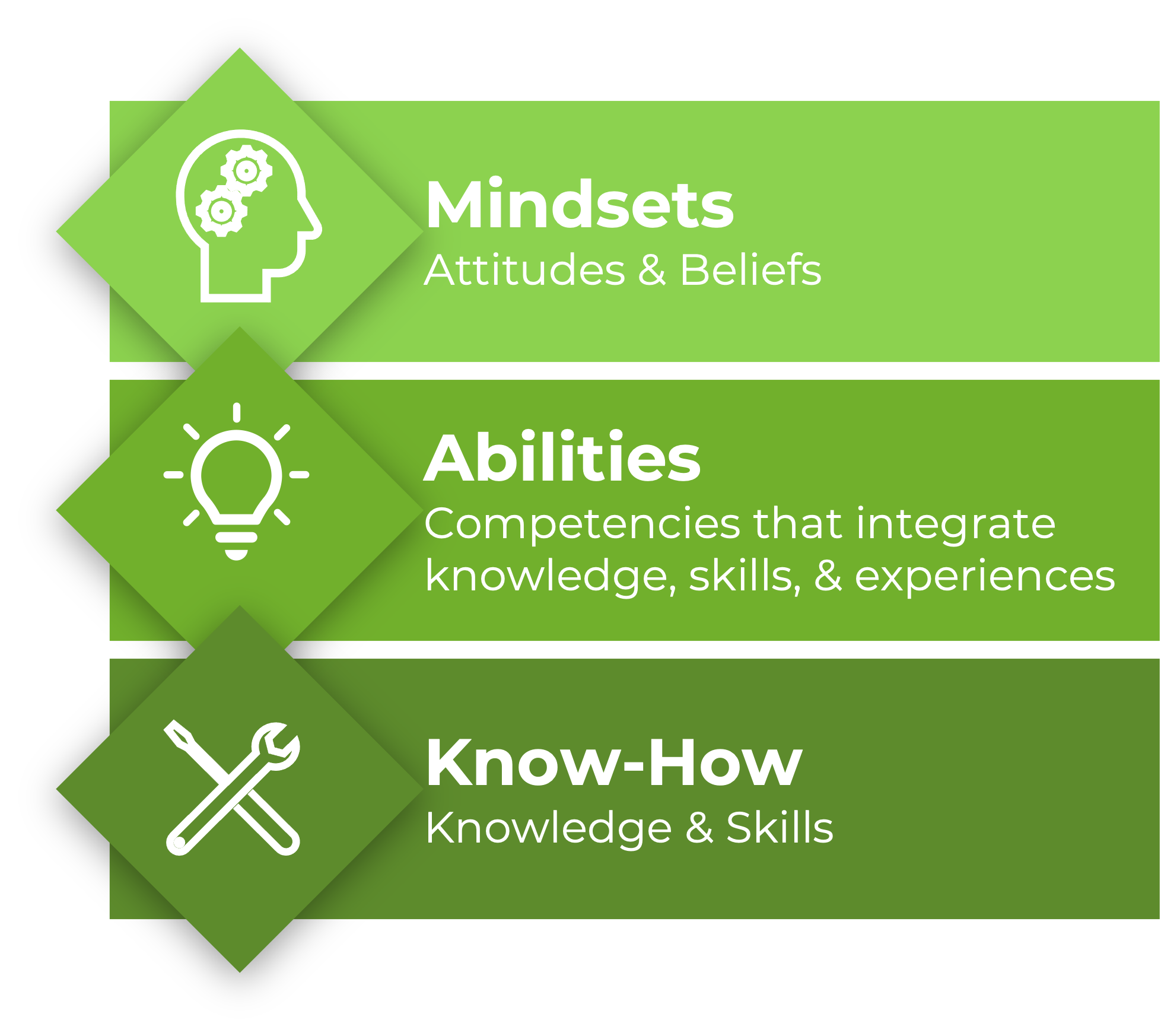
Empowering Success in Business and Life
We’re on the cusp of a revolution in reinventing how we view what leads to satisfaction and success personally and professionally. For example, companies including Google, Apple, Tesla, IBM, Home Depot, Bank of America, Starbucks, and Hilton no longer require a university degree for an interview. These organizations understand that future success relies on way more than diplomas.
Researchers have also started to challenge the conventional definition of intelligence, as well as preconceived notions of success. Stanford University’s Carol Dweck, for example, says that people who possess a “growth mindset” (who view intelligence as stemming from continuous learning, development, and hard work) actually achieve more in life, irrespective of how high their IQ may be.
Thriving in today’s disruptive world requires much more than using your intellect (IQ) and managing your emotions (EQ). Agility and resilience, two things increasingly important for innovation, for example, come from connecting your intellectual and emotional intelligence with what you’ve gained from your array of experiences.
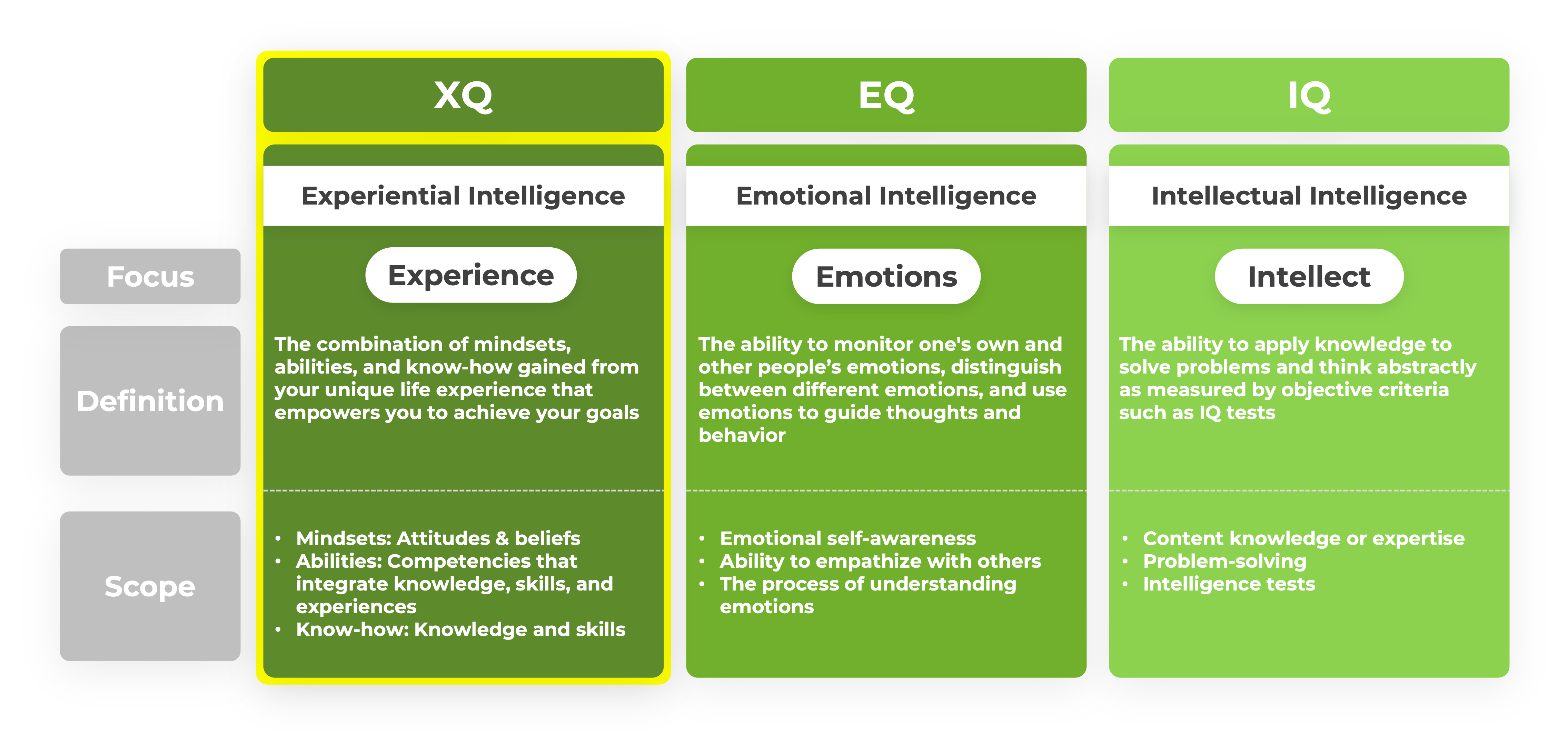
So, what can you do with Experiential Intelligence as a leader and for your organization? Some specific opportunities include:
Facilitate Personal Growth & Development
- Use positive psychology to uncover and amplify strengths
- Overcome self-limiting beliefs
- Gain insight into the personal assets to leverage to achieve goals
Drive Innovation
- Accelerate innovation by harnessing diverse team experiences
- Increase success by leveraging the key mindsets and abilities across the innovation process
- Create a culture of innovation
Revolutionize Leadership Development & Talent Management
- Hire “outside the box” to obtain more strategic talent
- Develop people’s mindsets, abilities, and know-how for competitive advantage
- Use next generation 360 development processes for breakthrough growth
Transform Teams & Organizations
- Uncover and leverage latent capabilities
- Scale best practices
- Foster greater engagement for strategic change
When you more fully understand the impact of the past on how you think, feel, and act, you increase self-awareness. This principle applies to individuals, teams, and organizations. By exploring your most poignant experiences with greater intention, you can discover hidden strengths that you can leverage to achieve your goals.
The idea that our experiences shape how we think and what we do is a no brainer. And that’s why it’s so important. In today’s increasingly uncertain world, we need simple ideas and practical tools to help us manage complexity and create a better future.
Get a free sample chapter, or buy the book now and get the bonus Toolkit for free. Buy 50 or more copies and get a free live webinar with Soren (limited time offer).
“This must-read book delivers deep insight into how our personal and professional experiences influence how we show up and perform at work, in our relationships, and life itself.”
— Loressa Cole, CEO, American Nurses Association
“Soren Kaplan provides us with a long overdue blueprint to more intentionally access the mindsets, abilities, and know-how gained from your unique life experience.”
— Michael Arena, Vice President, Talent & Development, Amazon Web Services
“The new lens of Experiential Intelligence broadens the talent conversation and opens possibilities for building a more diverse workforce.”
— Rebecca Romano, Global Head of Talent & Organizational Development, NBCUniversal
“Experiential Intelligence is the ultimate guide to equip leaders to know who has the talent they need to propel their business into the future.”
— Dr. Marshall Goldsmith, Thinkers50 #1 Executive Coach and New York Times bestselling author of The Earned Life
“Experiential Intelligence uses powerful storytelling to take us on a journey to deeply understand our own XQ and how to maximize the impact it has on our leadership and business success.”
— Pat Verduin, Ph.D., Chief Technology Officer, Colgate-Palmolive
“This book mines the treasures latent in all human beings and helps us welcome unknown talent in ourselves and others.”
— Kent Packard-Davis, President, Women Forward International
